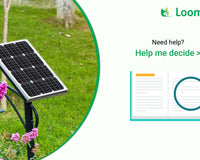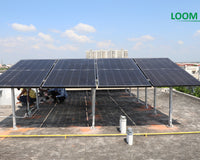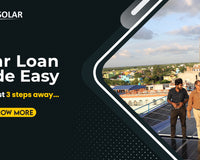The purpose of this blog is to educate our readers about the different components of a solar system. Often people confuse a solar panel for a whole solar system as solar panels are the most visible parts of the solar system. Even when you google solar system it takes to the universal solar system instead of the one comprising of solar panels, solar inverters, batteries, etc. Let us take a look at the various components of a solar system, its types and the price range it is available for. We will also learn about the benefits of installing a solar system in this blog.
What is Solar System?

A solar system is a complete set of components used to generate power. A solar system is a setup that generates electricity by utilizing the solar energy. A typical solar system consists of solar panels (which absorb sunlight), inverter (which converts DC into AC), mounting structure (that hold the panels in place), batteries (to store the extra power generated), grid box and balance of systems (wires, nuts etc.). A solar system comes in various sizes like 1kW, 3kW, 5kW, 10kW etc. It comprises of:
a) Solar Panels/ Modules

The most important component of a rooftop system are solar panels. They are the center of the system and everything revolves around them. Solar modules comprise almost 50% of the total cost of the system. Different types of solar modules will give different results.
b) Inverters

Inverters are the powerhouses of the entire solar system that convert DC into AC. Approximately 25% of the total solar system cost comprises of inverters.
c) Batteries

They store the excess energy generated by the panels which can be used later when the sun goes down. Batteries are charged using solar panels. Higher the AH, higher will be backup time. Usually, a 150 Ah battery gives around 3 hours of backup on 400 watt power consumption. In India, 150 Ah is bestselling rating as it can last up to 3-4 hours if you use Led light, few ceiling fans, Led Television, mobile and Laptop charging.
d) Balance of Systems

These include accessories like wires, cabling, mounting structures, junction boxes etc.
People/ buyers are also confused between an on-grid and off-grid solar system. An on-grid solar system is a system which works along with the grid, while an off-grid solar system works independent of the grid. It is more popular in India and comes with a power backup.
Importance of Solar System?
In this paragraph, we will discuss about the benefits of installing a solar system. Due to falling costs and improving technology, solar has become a mainstream source of electricity generation. Not only that, it is also a lucrative business option.
1. Investment Opportunity

People are always looking for lucrative business opportunities. They typically prefer low-risk and high return businesses and solar is one of them. It is estimated that out of the 35-40 industries in India, renewable energy will be the most profitable industry over the next decade. It is claimed that an investor can earn up to 20% ROI per annum by investing in solar business. Solar as an investment opportunity is ideal for businessmen, real estate companies, hospitals, hotel businesses, etc. These businesses have extra funds in hand, and are always looking for profitable business ventures. Below are possible showing investment opportunities with return, and risk factor.

Solar business makes complete sense financially as the electricity tariff is very high in India. Installing a solar system is a viable option, because 1 kW solar system can roughly generate about 1500-1600 units of power annually. Some of the residential complexes charge around Rs. 7-8 per unit for electricity. You can therefore, recover your money in roughly 6-7 years’ time. If you put this money in a bank, you earn interest at the rate of 7%-8% max. The stock market is high risk, high return investment and is highly volatile too.
2. Reducing Electricity Bill

One of the major incentives of installing a solar system in your home is the reduction in the monthly power bills which is surmounting in the states of India. People, particularly homeowners are looking at installing solar system for this purpose. They are happy to save their hard-earned money and this saving is their earnings.
3. Power backup

Many establishments such as small shops, offices, clinics, etc. install a solar system for power backup. Solar power offers a good alternative when there is a power cut. With a good power storage option, solar offers an ideal source of power supply. People also save on expensive diesel cost which is involved in the running of gensets.
Solar System Range & Their Output Per Day

Nowadays, solar is finding increased applications. It is now easy to spot a solar panel mounted in schools, offices, hospitals, residential complexes, banks, railways, airports, parking lots, government buildings etc. As such solar system in available in various sizes and capacities in order to meet the needs of different customers. See full our installations.

Price of Solar System in India
We have grouped these solar systems as below:
1-10 kW Solar System - is generally installed in residences, schools, petrol pumps, etc. It typically costs Rs. 1 lakh per kW.
11-50 kW Solar System - is generally installed in factories, hotels, hospitals, etc. It costs approximately Rs. 75,000 per kW.
51 kW and more - are utilized in solar parks, and utility solar. These cost around Rs. 50,000 per kW.
An Off Grid Solar System typically costs Rs. 98,000 per kW while an On Grid Solar System costs Rs. 75,000 per kW.
Solar System Subsidy
Before installing a solar system, people generally look for Indian government subsidy on solar system. The cost for a typical 1 kW rooftop system is roughly around Rs. 80,000 - Rs. 100,000. You can claim a capital subsidy of 30% on the cost. Capital subsidies and incentives like accelerated depreciation, tax holidays, excise duty exemptions in India are other important considerations before installing a solar system. Approximately 50% of the cost can be saved through capital subsidies and AD. In the west, USA’s investment tax credit has played a vital role in boosting solar installations across the country.
However, the sad part in our country is that though the government prescribes 30% capital subsidy to the Indians for installing a solar system, most of it remains true only on paper. Only a handful of people have actually got it.
Do You Need Solar System for Sale?

If you are looking for solar system for sale, you can contact us for Loom Solar dealership. We are offering dealership in different parts of the country to reach out to as many people as possible. You can contact us on 011-4013 0202 to enquire about existing availability in your area.
To understand in Simple Language, Watch this video-
Headquartered in Delhi NCR, Loom Solar is India's leading solar brand store. The company sells solar systems such as solar panels, solar inverters, solar batteries for top brands with installations and government approvals all over India. Loom Solar has strong online as well as retail store presence in India. The company also offers attractive discounts to its customers and has the vision to help customers make more informed decisions regarding buying solar systems.
Some Popular Solar Myths
Will a Solar System operate in Kashmir?

Yes, solar system will work perfectly in the cold parts of the country like Kashmir, as well. A solar system needs sunlight to function. Only during the months of December to March, when there is heavy snowfall, solar system might not function, but otherwise it works fine.
List of Best Solar System Companies in India
Here is the list of the leading solar system companies as per complete solar solutions in India. Just scroll down.
1. Loom Solar

Strength – On Grid Segment
Loom Solar is a growing solar company with a huge online presence. It is headquartered in Faridabad, Haryana. Loom Solar provides latest solar products such as solar systems, solar panels, solar inverters and solar chargers; delivery and installation across India within three days; and hassle free government approvals for subsidy, net metering. The company has also started manufacturing their own range of solar panels.
Website: www.loomsolar.com
2. Luminous

Strength – Off Grid Segment
Luminous is a New Delhi-based maker of inverters and industrial batteries with Schneider having a 74% stake in it. The company sells both grid-tied inverters as well as inverters for off grid solar applications. Luminous has over 30 years of experience as a leading power solutions provider.
Website: www.luminousindia.com
3. Microtek

Strength – Off Grid Segment
Microtek is a premium brand in the Indian Solar Industry.
Website: www.microtekdirect.com
4. Tata Power Solar

Strength – On Grid Segment
Tata Solar is engaged in manufacturing and providing EPC services. The company has a strong presence in industrial, commercial, both on-grid and off-grid solar projects, and residential segments. Tata Solar has shipped close to 1.4 GW of solar modules worldwide and installed 1.5 GW of utility scale and 200 MW of rooftop solar projects in India, in the past 20 years.
Website: www.tatapowersolar.com
5. Patanjali

Strength – Off Grid Segment
Patanjali Renewable Energy is an independent renewable energy service provider having a growing presence in different parts of India. The company has an existing capacity of 150 MW and its goal is to reach 500 MW by 2021.
Website: www.patanjaliayurved.net
6. Gautam Solar

Strength – Street Lighting systems
Gautam Solar is one of the most trusted partners for solar power and clean energy solutions in India. It is one of the largest manufacturers of solar lights in India and also has a presence across ten other countries.
Website: www.gautamsolar.com
7. Shakti Solar

Strength – Solar Water Pumps
Shakti Solar is India's leading manufacturer of energy efficient submersible pumps.
Website: www.shaktipumps.com
8. Lubi Solar

Strength – Solar Water Pumps
Lubi Solar is the solar arm of the leading Lubi Group of Industries having a rich heritage of more than five decades in India. Headquartered in Gandhinagar, Gujarat, Lubi Solar was founded in 2012 and in just six years’ time has developed a fully automatic solar module manufacturing line of 150 MW spanning across 30,000 square feet area.
Website: www.lubisolar.com
Watch Video
Conclusion
Now that you have taken a decision to install a solar system, it is very important to first know your energy requirement, the type of appliances that can run through a solar system and the size of the system. The dimensions and weight of the panels and mounting structure, panels with different efficiency levels – all affect the calculations. The amount of sunlight your location gets is another important factor to determine the efficient working of a solar system. It is important to do your math before installing a Solar system.
हिंदी में पढ़े: घर के लिए सोलर सिस्टम या सोलर प्लेट












